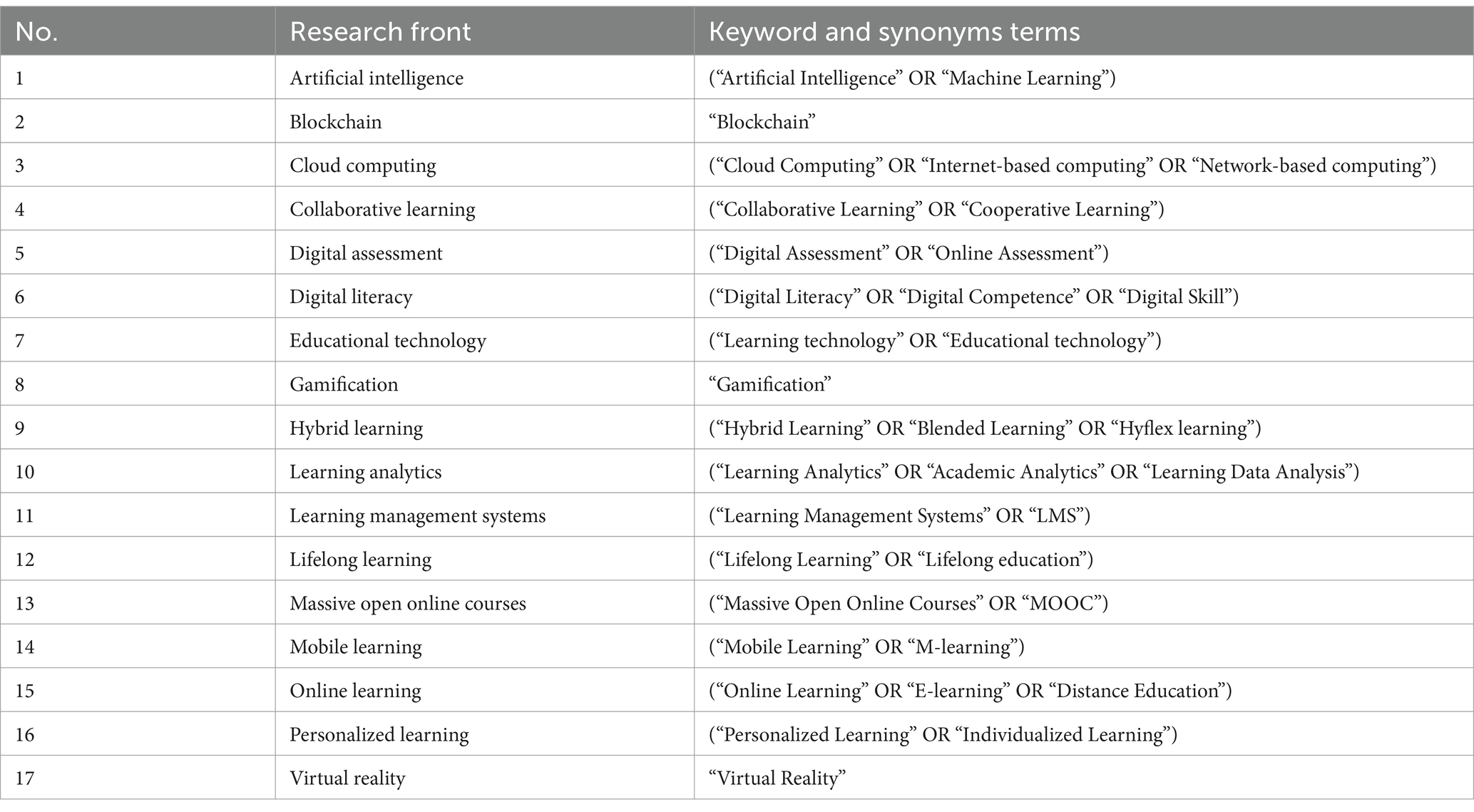- 1Faculty of Education Science, Nguyen Tat Thanh University, Ho Chi Minh City, Vietnam
- 2Faculty of Management Science, VNU University of Social Sciences and Humanities, Hanoi, Vietnam
- 3UPM Innovation Institute, Hanoi, Vietnam
Introduction: This study explores impactful research fronts within the digital educational ecosystem using an extended Clarivate approach with a newly formulated Impact Factor (IF) metric. The research addresses limitations of the original Clarivate Citation Production Trajectory (CPT) by integrating a broader IF metric.
Methods: The IF metric expands evaluation by incorporating publication count, growth rate, core paper presence, and citation behavior. It also measures the publication gap between core and citing articles to track developmental shifts. Scopus data from 2019–2023 serve as the analysis base.
Results: The analysis reveals key research fronts such as online learning, artificial intelligence, virtual reality, hybrid learning, and digital assessment. Online learning and AI emerge as the most influential.
Discussion: The IF metric enhances precision in detecting impactful fronts over CPT and maps global research activities, highlighting growing contributions from developing regions. This refined approach helps assess both short-term relevance and long-term influence in digital education. The findings emphasize a more inclusive landscape of impactful research across institutions and nations.
Introduction
Research fronts are dynamic, knowledge-driven clusters of scholarly activity that emerge in response to pressing problems, innovative methodologies, or groundbreaking discoveries. These clusters represent interconnected networks of researchers and their work, unified by shared citations or thematic keywords. The concept of research fronts was first articulated by Garfield (1955) in his seminal work on citation indexing, which demonstrated how citation patterns reveal precise and objective connections within the scientific literature. This approach offers a clear representation of research themes, free from subjective interpretation.
Price (1965) further developed the concept by introducing the notion of an “immediacy factor” in scientific communication. He emphasized that research fronts are characterized by tightly interconnected networks of recent publications, with dense citation links marking them as hubs of current scientific exploration and rapid discovery. This framework provides a powerful lens for identifying and understanding emerging trends and transformative shifts in the landscape of scientific knowledge.
The structure of research fronts is defined by two core components: highly cited core papers, which establish the foundational knowledge, and citing papers, which expand and build upon these core ideas (Small and Griffith, 1974). This dual structure facilitates tracking both the established knowledge base and the evolving boundaries of research innovation. Zheng et al. (2016) highlighted the importance of keyword co-occurrence analysis in systematically identifying research fronts, demonstrating the value of bibliometric methods in capturing their evolution. Advanced techniques such as co-citation analysis and co-word analysis are crucial for identifying and analyzing these domains (Li and Chu, 2017). Mazov et al. (2020) further refined the definition, describing research fronts as groups of recently published articles with a shared topical focus, characterized by strong internal citation networks and relatively weak external connections.
According to Clarivate Analytics (Research Fronts, 2017, 2024), research fronts are not merely reflections of prevailing trends but are also predictive of future developments, providing insights into emerging scientific priorities. This definition emphasizes the structural characteristics that distinguish research fronts from broader research trends. Over the last 10 years, Clarivate’s analysis has identified 110 especially active or “hot” research fronts, as well as 15 emerging fronts, with the latter selected based on notably recent core literature from each year.
Clarivate Analytics bases its methodology on the so-called Citation Productivity and Trajectory CPT metric, which primarily focuses on highly cited papers, citing articles, and their average publication age. However, this metric has limitations, particularly in terms of capturing the dynamic and evolving nature of research fronts. To achieve a more comprehensive assessment of impact, it is essential to consider additional factors such as publication productivity and the diachronic growth rate of research fronts. Furthermore, relying solely on the age of citing articles can be insufficient for understanding the temporal evolution of knowledge. Therefore, this study proposes an enhanced formulation by evaluating the gap between the average publication years of core papers and their citing papers, thereby offering a more nuanced perspective on the temporal progression of research.
The digital educational ecosystem encompasses the interconnected platforms, tools, and stakeholders that support learning, teaching, and educational management in a technology-driven environment. This ecosystem includes various digital education tools or technologies such as online learning platforms, learning management systems, educational analytics, and gamification strategies. The rapid evolution of digital education, especially in the wake of global disruptions like the COVID-19 pandemic, has intensified the need for innovative pedagogical approaches and advanced technological solutions. Investigating research fronts within this domain is essential for uncovering cutting-edge advancements, addressing global educational challenges, and driving pedagogical innovation.
Identifying research fronts in the digital educational ecosystem is particularly relevant given the increasing reliance on technology in education. This field presents an ideal case for testing any modifications to Clarivate’s existing formulation, as it combines both technological and educational innovations that evolve rapidly over time. Additionally, examining the geographical distribution of research in this domain can highlight disparities in contributions, access, and engagement across different countries and regions. Such an analysis can provide insights into how various national and institutional policies shape research priorities and how global trends influence local research outputs.
This study investigates the most active and emerging research fronts within the digital educational ecosystem by analyzing bibliometric data and relevant literature. Specifically, it addresses the following research questions:
i. How can the Clarivate formulation be further developed to better identify impactful research fronts, and what are the advantages of this new approach?
ii. What are the prominent research fronts identified through the application of this extended Clarivate formulation to the digital educational ecosystem?
iii. What is the geographical distribution of the observed research fronts in terms of nations and higher education systems?
Literature review
Most influential research fronts notion
Research fronts are typically grouped into three primary categories: (i) emerging research fronts, which signal novel areas of investigation driven by innovative methodologies or unresolved issues; (ii) hot research fronts, characterized by heightened academic engagement and rapidly increasing citations and outputs; and (iii) impactful research fronts, which have a lasting impact on scholarly discourse, policy decisions, and industry practices.
Recognizing emerging, hot, and impactful research fronts provides valuable insights into the evolution of knowledge within various scientific disciplines. These classifications help researchers differentiate between early-stage ideas and well-established concepts with broader academic and practical relevance (Research Fronts, 2024). Additionally, the use of bibliometric indicators to measure the intensity or influence of a research front underscores their importance in facilitating cross-domain comparisons.
Formulation of most influential research fronts
The methodology for identifying and characterizing research fronts involves advanced bibliometric techniques coupled with qualitative insights. Besides traditional qualitative validation, key approaches include: keyword co-occurrence and enhanced co-word analysis (Zheng et al., 2016; Li and Chu, 2017), Co-Citation and Bibliographic Coupling (Research Fronts, 2017), and Trend Analysis (Research Fronts, 2024).
Among them, the methodology for identifying and analyzing research fronts combines bibliometric analysis with advanced statistical metrics, emphasizing the evaluation of core papers and citation trends is introduced in the Research Fronts reports (e.g., Research Fronts, 2017, 2024). There, refined indicators, such as the number of core papers (Pcore) and the CPT index, are integral to capturing the dynamics of impactful research fronts. In such study, the CPT indicator, which is defined as the ratio of the average citation impact of a research front to the age/occurrence of its citing papers and is calculated as follows:
Where:
- Pcore is the number of foundational core papers, i.e., the highly cited papers;
- Pciting represents the number of citing articles, i.e., the total of articles citing the core papers;
- Tciting indicates the age of citing articles, which is the number of citing years, from the earliest year of a citing paper to the latest one.
In this case, the higher the CPT number, the hotter or the more impactful the topic.
CPT is the ratio of the average citation impact (Pciting/Pcore) of a research front to the age/occurrence of its citing papers (Tciting), meaning the higher the number avergare citation, the hotter or the more impactful the topic. It measures how extensive and immediate a research front is and can be used to explore the developing aspects of research fronts and to forecast future possibilities. The degree of citation impact can also be seen from CPT, while it also takes the average publication years Tciting of citing papers into account and demonstrates the trend and extent of attention on certain research fronts across years.
This CPT approach emphasizes the core number of published articles (Pcore) and their citations (Pciting). It does not account for the growth rate (R) and the interaction between published (or core) and citing publications. Notably, the growth rate (R) of both published and citing articles is absent, which is crucial for understanding extensive and immediate trends. To identify impactful research trends, it is essential to also consider publication productivity (S). Specifically, examining the gap between the average publication years of published and citing papers, Tpub and Tciting, respectively, can offer valuable insights. A narrower gap (ΔT = Tciting – Tpub) indicates emerging trends and suggests stronger alignment with global research directions. Taking these issues into account, Tran Ai Cam (2025) initially developed the Emerging Factor (EF) of emeriging research fronts by incorporating the growth rate (Rpub) and Rciting of published publications and Rciting of citing articles using the following formula:
As a results, emerging research fronts identified include Digital Assessment, Blockchain, Artificial Intelligence, Lifelong Learning, and Online Learning, each demonstrating significant growth and influence on digital education practices. In addition, the geographical analysis highlights substantial contributions from leading institutions in the United States, China, and Europe, underscoring the global nature of research in the digital educational ecosystem. This study provides critical insights for educators, policymakers, and researchers, offering a comprehensive overview of the current landscape and future directions in digital education research.
The development of the Clarivate formulation to better identify impactful research fronts remains an open challenge. This study aims to address this gap by proposing an enhanced approach.
Methodology
Search strings
To address the research questions, bibliometric data was collected from Scopus database, covering all publication types (journal articles and conference papers) from 2019 to 2023. In this study, the selection of high-frequency keywords was informed by a triangulated approach comprising: (i) a review of previous systematic reviews and bibliometric studies in the field of digital education; (ii) expert consultation with scholars and practitioners specializing in educational technology, instructional design, and digital pedagogy; and (iii) a pilot keyword frequency analysis using preliminary Scopus data from 2018 to 2023 to identify terms with consistently high relevance and citation linkage. This multifaceted process ensured that the selected keywords reflect both influential and emerging themes within the digital educational ecosystem, aligning with historical research trends and forward-looking innovations. Ultimately, 17 keywords were selected for analysis based on the criteria that each had either a total publication count exceeding 1,000 or a growth rate >1.25 (see Table 1). These keywords reflect key themes and technological trends shaping modern education, including Artificial Intelligence, Blockchain, Cloud Computing, Collaborative Learning, Digital Assessment, Digital Literacy, Educational Technology, Gamification, Hybrid Learning, Learning Analytics, Learning Management Systems, Lifelong Learning, Massive Open Online Courses (MOOCs), Mobile Learning, Online Learning, Personalized Learning, and Virtual Reality (see Table 1). Each keyword represents a distinct domain within the digital educational landscape, contributing to the formation of research fronts by addressing critical challenges and advancements.
The search syntax was defined as follows: TITLE-ABS-KEY [(“synonyms keyword terms”) AND (“higher education” OR “universit*” OR “college*”)]. This search string was designed to ensure the validity and reliability of the data collection. The results, including all available bibliometric information, were exported in CSV format after a thorough manual check.
Key metrics analysis
Figure 1 illustrates the search string and analysis process, outlining the various steps involved. The source data consists of Scopus’s annual number of published papers at year y [Spub (y)]. At the first output level (Output 1), the total published production (S) and its growth rate (R) are calculated according to the following equations:
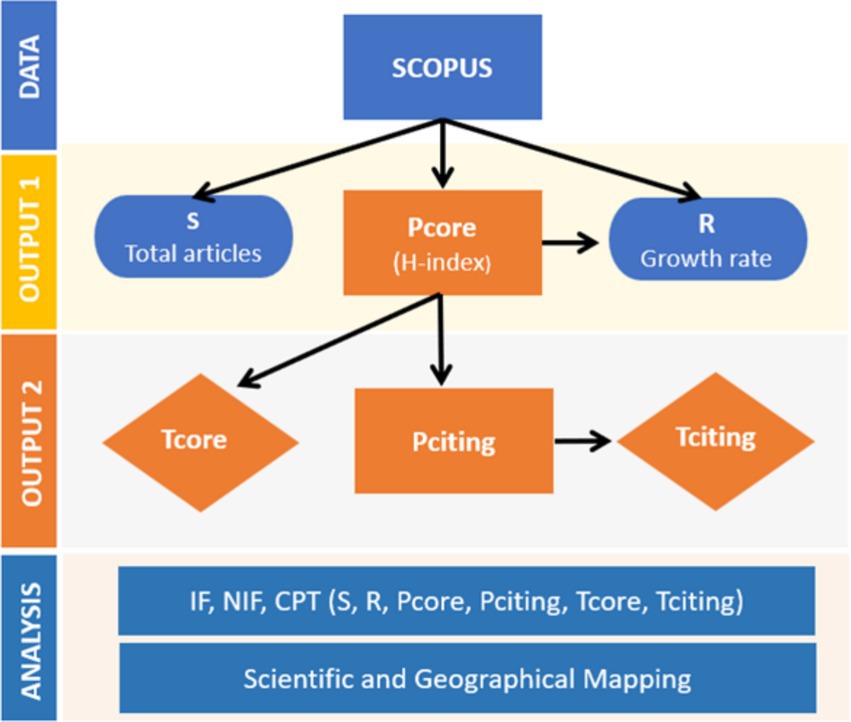
Figure 1. The search string and analysis process development from Chung and Cam (2024).
To determine the number of highly-cited core papers (Pcore), articles are ordered in descending order of citations, and the Hirsch score (H-index) (Hirsch, 2005) is computed. The H-index represents both the productivity and impact of a scholar or group, and it is used here to identify Pcore.
At the second output level (Output 2), the step involves determining the annual number of core articles at year y [Score(y)] and the annual number of citing articles at year y [Sciting(y)], i.e., the number of articles citing the core published papers. From that, the average core publised year (Tcore), total citing papers (Pciting) and the average citation year (Tciting) using following formulas, respectively:
Impact factor formulation of the research fronts
Regarding impact aspects, the immediacy of the published papers is a priority, and that is why it is characterized as “impact.” To identify impact specialties, the total published productivity S, growth rate of R, Pcore and Pciting are key metrics. Additionally, the average year of the core published papers (Tcore) and citing papers (Tciting) offer valuable insights. The closer T is to the present, the more it reflects emerging trends. In particular, the narrower gap between the publication years of published and citing papers (ΔT) suggests a stronger resonance with global research trends. In this case, ΔT is evaluated as a consequence from the first and second output levels, determined by the time distribution of their publications (Figure 1):
For the introduction of the concept of the Impact Factor (IF), the development of the Clarivate Analysis should take into acount these key metrics. The approach reflects both the extent and immediacy of a research front. Therefore, we introduce a new indicator for the impact factor (IF) of research fronts as follows:
Here, besides the Pcore and Pciting - the indicators mentioned above in the Citation Productivity and Trajectory CPT indicator, the total articles S published in the investigated period times, the growth rate R, and the gap between the average (mean) years of the core and citing papers ΔT are introduced.
Unlike the CPT metric, which primarily focuses on citation volume and the age of citing articles, the proposed Impact Factor (IF) metric provides a more holistic view by integrating five key dimensions: total publication output (S), growth rate (R), the number of core papers (Pcore), citing papers (Pciting), and the temporal gap (ΔT) between core and citing publications. This composite view addresses the limitation of CPT in capturing only static citation dynamics and overlooks emerging trends with smaller yet rapidly growing scholarly attention. From a practical standpoint, the IF metric offers actionable insights for policymakers and research funding agencies. By identifying not only historically cited areas but also rapidly expanding fronts with high immediacy and scholarly momentum, IF enables early detection of research domains that are gaining strategic relevance. This supports more responsive decision-making in research investment, priority setting, and national innovation planning.
To enable comparative analysis, the above-mentioned Impact Factor (IF) values were normalized using the maximum IF observed across all research fronts under investigation. This normalization transforms the values into a unitless [0, 1] scale and is defined as:
Where IFi is the raw impact factor of research front i, and the denominator represents the maximum IF value among the (n = 17) investigated research fronts.
This approach allows direct comparison of impact levels across research fronts with varying publication scales and citation volumes. It also provides a consistent basis for benchmarking against alternative metrics, such as the normalized CPT (NCPT). By standardizing the units, the NIF facilitates clearer visualization, ranking, and identification of strategic priorities - an essential benefit for policymakers, funding agencies, and institutional decision-makers.
The analysis process presents the values of the Impact Factor (IF), Normalized Impact Factor (NIF), and Citation Productivity and Trajectory (CPT) indicators, along with Scientific and Geographical Mapping.
Results and discussion
Impactful research fronts in the digital educational ecosystem
Besides Equation 2, which is mentioned for literature purposes only, Equations 3–10 are used to determine the total number of publications (S) and the growth rate (R), the average core publication year (Tcore), the number of citing papers (Pciting), the average citation year (Tciting), the time gap (ΔT), the Impactful IF, and the normalized NIF, respectively. Table 2 presents the results of the data collection for the total (S) number of articles published from 2019 to 2023 for the 17 research fronts mentioned above. The results show that the topics most frequently researched and published are: Online Learning (with a total of 17,675 articles over 5 years), Artificial Intelligence (11,572 articles), Virtual Reality (3,221 articles), Hybrid Learning (2,499 articles), Educational Technology (2,135 articles), Collaborative Learning (1,933 articles), Learning Management Systems (1,372 articles) and Gamification (1,347 articles), etc.
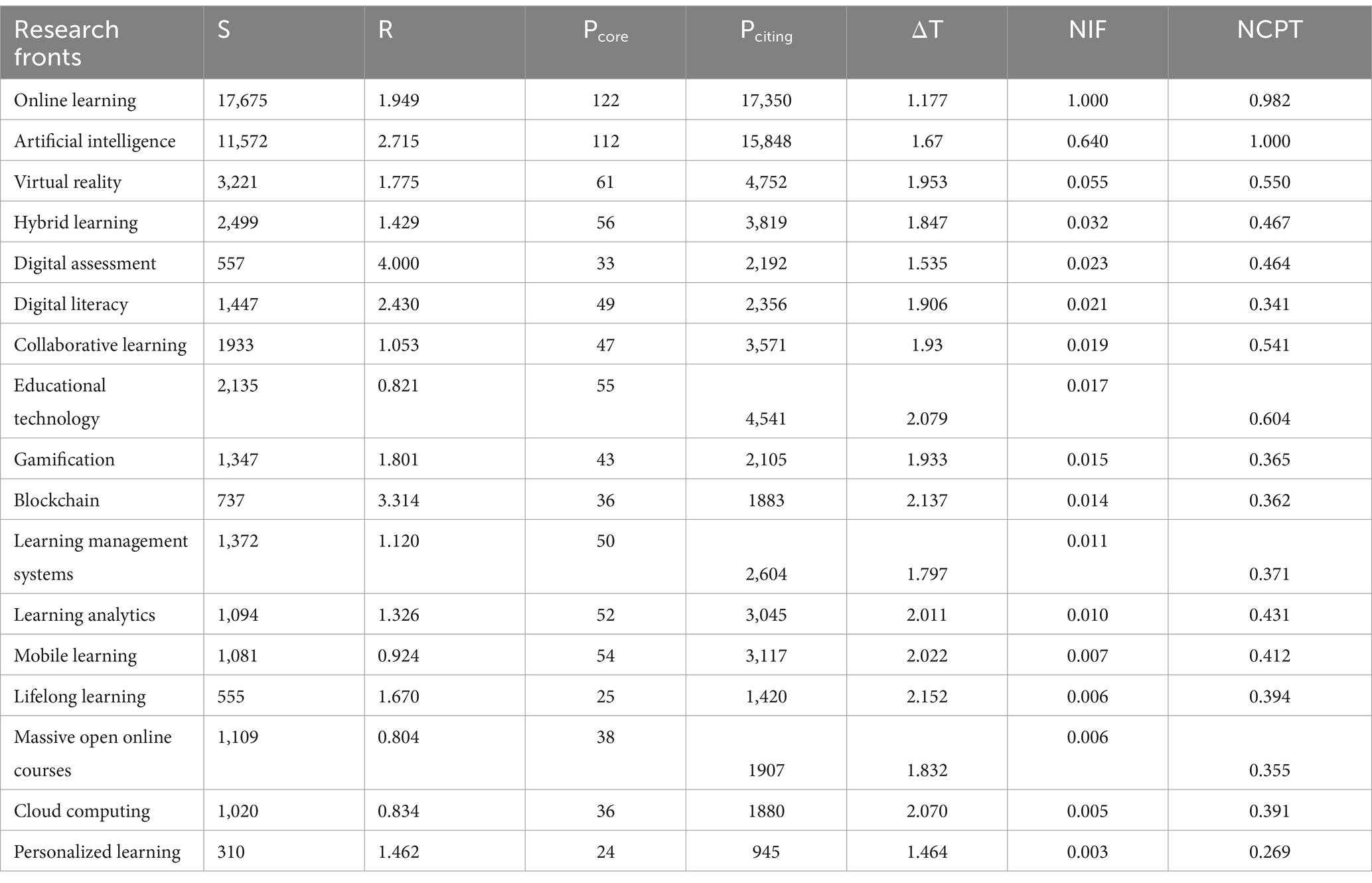
Table 2. The total number of the publications (S) and the growth rate (R) core papers (Pcore), citing papers (Pciting), time gap (ΔT), normalized NIF and NCPT of research fronts.
The growth rate (R) of publications over the past 5 years was estimated using formula the ratio S(2019)/S(2023). Accordingly, the eight topics with the highest R ratios are: Digital Assessment (R = 4.0), Blockchain (R = 3.31), Artificial Intelligence (R = 2.71), Digital Literacy (R = 2.43), Online Learning (R = 1.95), Gamification (R = 1.80), Virtual Reality (R = 1.78) and Lifelong Learning (R = 1.67). Notably, for the first two research fronts, in 2019, only a few dozen scientific articles were published globally each year, but by 2023, the number had risen to several hundred, even close more than 1,000 articles published annually for the third front. As shown in Table 2, Digital Assessment, Blockchain, Artificial Intelligence are truly emerging research topics in the digital educational ecosystem, followed by topics like Digital Literacy, Online Learning, and Gamification.
It is observed that some research fronts have a high number of annual publications and are still quite relevant, but globally, they have almost reached saturation over the past decade. These research topics include Learning Management Systems, Collaborative Learning, Mobile Learning, Cloud Computing, Educational Technology and Massive Open Online Courses. Even, for the three latte fronts, R is smaller than one, e.g., a negative trend is observed.
The gap ΔT between the average years of the core and citing papers ranges from 1.177 to 2.152 years (see Table 1). As already mentioned above, the smaller ΔT the more immediate respond of the citing papers. In this case, a notable observation is that the small ΔT is corresponding to the high growth rate R for three research fronts: Online Learning (R = 1.95 and ΔT = 1.177), Digital Assessment (R = 4 and ΔT = 1,535), Artificial Intelligence (R = 2,715 and ΔT = 1.67).
The normalized impact factor (NIF) for each research front was determined using Equation 9 and listed in Table 2. The five research fronts with the highest IF are: Online Learning (NIF = 1.0), Artificial Intelligence (NIF = 0.640), Virtual Reality (NIF = 0.055), Hybrid Learning (NIF = 0.032), Digital Assessment (NIF = 0.023). It is observable from Table 2 that, the IF values dominated by S and Pciting values. It means that the impactful research fronts are characterized by a mass research productivity and high number of citing papers.
For a clearer visualization, Figure 2 presents an analysis of various research fronts within the digital educational ecosystem across multiple normalized bibliometric indicators, revealing significant trends in research impact, productivity, and the gap between the average years of the core and citing papers of these fronts. Notably, the Impact Factor (IF) decreases very rapidly and approaches near-zero after the first two research fronts, namely Online Learning and Artificial Intelligence. This steep decline indicates that the concentration of highly impactful research is limited to a small number of leading topics. After these two dominant areas, subsequent research fronts demonstrate much lower impact values, suggesting that they have less influence in high-impact journals.
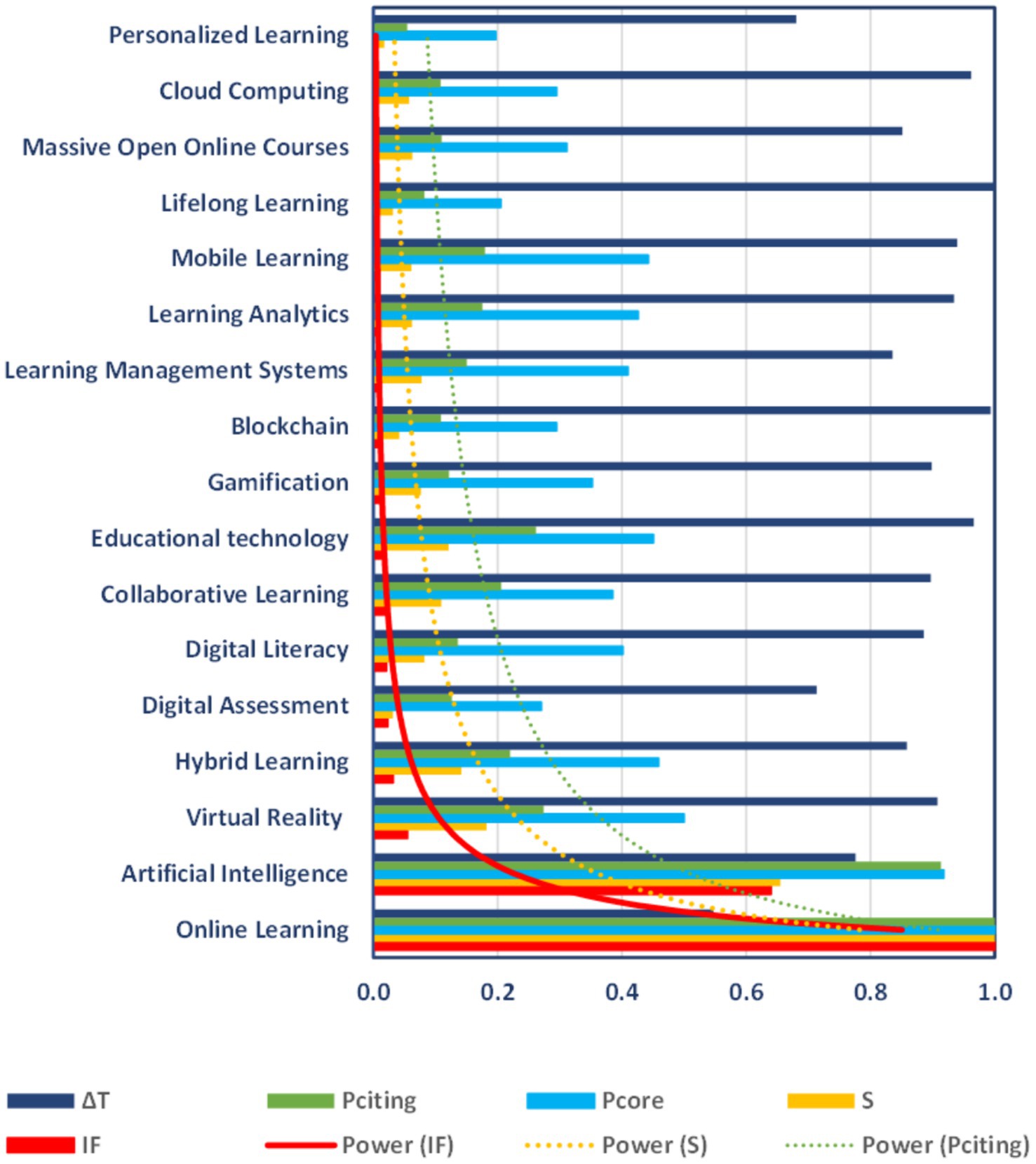
Figure 2. The total number of the publications (S) and the growth rate (S), core papers (Pcore), citing papers (Pciting), publication gap (ΔT) and normalized NIF of research fronts.
Similar trends are observed in the metrics of productivity (S) and citing papers (Pciting). These metrics show a gradual decline across the research fronts, with Online Learning and Artificial Intelligence maintaining the highest levels of productivity and citation influence. This decline in citing papers indicates that fewer research articles from the later-listed fronts are referenced by other works, which reduces their overall visibility and influence in the academic community. The diminishing values of productivity and citing papers across most research fronts suggest a concentration of research efforts and recognition in a few key areas while other fronts remain underexplored or less recognized.
In contrast, the indicators of core papers (Pcore) and the average publication gap (ΔT) display more scattered and inconsistent patterns. Pcore, representing the number of essential publications within each research front, does not follow a clear increasing or decreasing trend across the fronts. Instead, it varies considerably from one front to another, implying that the number of core publications is not directly tied to either the productivity or impact of a given topic. This variability indicates that some research fronts have produced a substantial number of core papers, while others have not, regardless of their impact or recognition in high-impact journals.
The average publication gap (ΔT) also shows a scattered distribution, suggesting diverse patterns of research development across different topics. Some research fronts exhibit more sustained and consistent growth over time, while others experience sporadic bursts of activity. This indicates that the temporal dynamics of research are not uniform across these fronts, reflecting differences in the pace and consistency of scholarly contributions.
Another key observation is that the IF metric is largely governed by productivity (S) and citing papers (Pciting). The figure shows that the two most impactful research fronts, Online Learning and Artificial Intelligence, also have the highest values for both productivity and citing papers. This suggests that the ability of a research front to achieve a high impact factor depends heavily on the volume of publications produced within the front and the extent to which these publications are cited by other works. In contrast, research fronts with lower productivity and fewer citing papers tend to have minimal IF values, indicating that research visibility and recognition are critical factors in determining impact. Therefore, boosting both the quantity of research output and the number of citations received appears essential for any research front seeking to achieve higher levels of impact within the academic landscape.
Overall, the figure highlights the dominance of Online Learning and Artificial Intelligence in terms of impact and productivity within the digital educational ecosystem. These two research fronts lead in all key metrics, underscoring their importance in current educational research. However, the sharp decline in IF, S, and Pciting after these leading fronts suggests that many other areas struggle to achieve significant impact and visibility. The scattered patterns of Pcore and ΔT further emphasize the uneven development of research across these topics, reflecting differences in both the number of core contributions and the temporal evolution of research outputs. These findings suggest that while some areas are well-established and influential, others remain fragmented and inconsistent in their scholarly contributions.
IF and CPT benchmarking
For comparison, the obtained hot research fronts are checked with the Equation 1 of the Citation Productivity and Trajectory CPT indicator. The findings are normalized and presented also in Table 2. The five research fronts with the highest NCPT are: Artificial Intelligence (CPT = 1.0), Online Learning (CPT = 0.982), Educational Technology (CPT = 0.604), Virtual Reality (CPT = 0.550), Collaborative Learning (CPT = 0.541). In comparison to the IF indicator, the Hybrid Learning and Digital Assessment research fronts drop out of the top five rankings, while Educational Technology and Collaborative Learning take their place. Notably, the Educational Technology front has a relatively low total publication count of 2,135, and its growth rate is 0.821. However, it includes 55 core papers and 4,541 citing papers, resulting in a rather high ratio of average citing papers to core papers Pciting/Pcore.
Similarly, the Collaborative Learning front exhibits a low total publication count of 1,933 and a modest growth rate of 1.053. Despite these figures, it comprises 47 core papers and 3,571 citing papers. This high number of core and citing papers again leads to a high ratio of Pciting/Pcore, indicating that both research fronts, despite their lower overall productivity and growth, attract significant attention from subsequent publications.
To provide a more direct representation, Figure 3 illustrates the variations of two metrics across various research fronts in the digital educational ecosystem: NIF (Normalized Impact Factor) and NCPT (Normalized CPT indicator), along with their respective power curves.
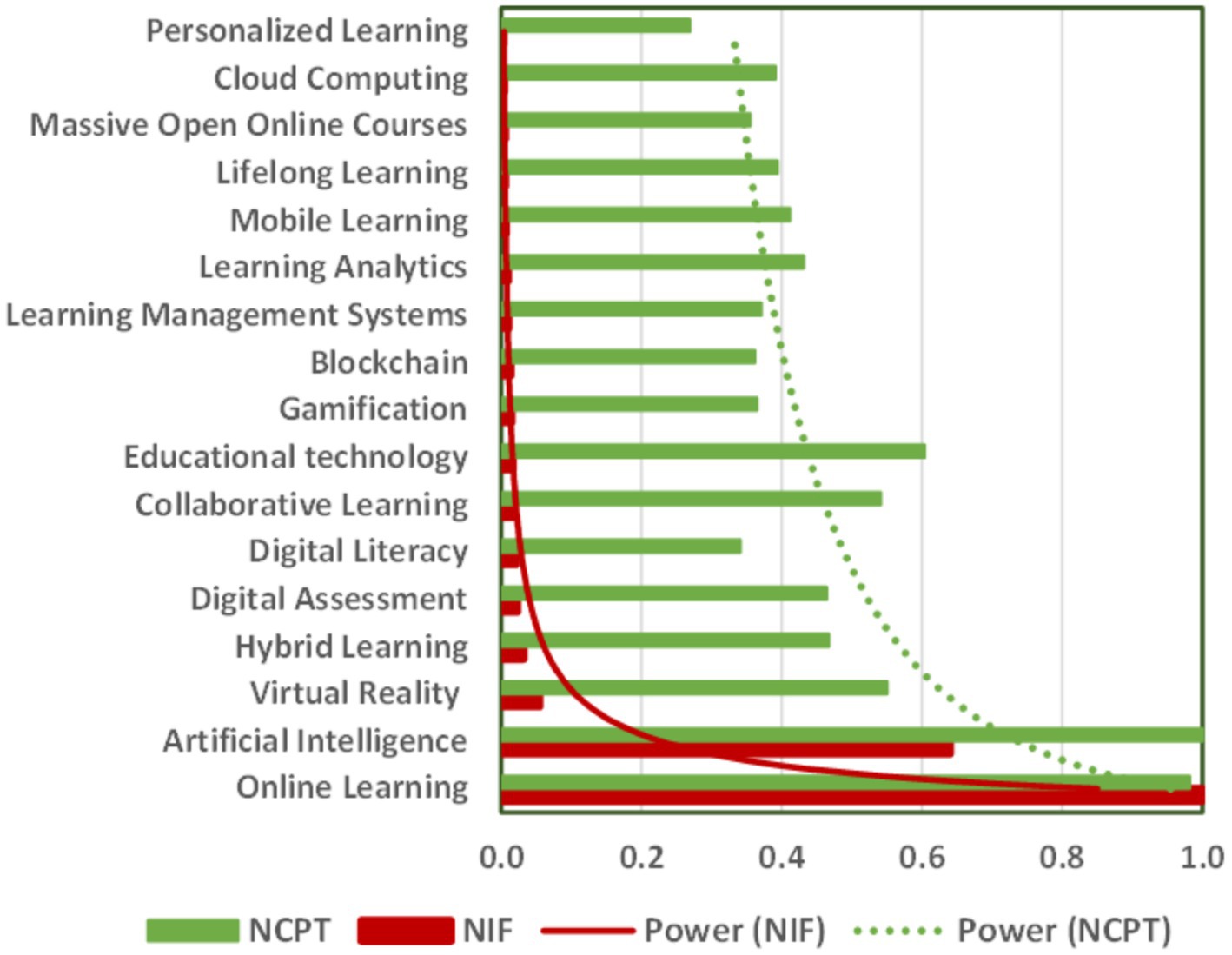
Figure 3. The comparison of normalized impact factor metric NIF and CPT indicator of research fronts.
As already mentioned above, the NIF curve demonstrates a steep decline, particularly after the leading research fronts, Online Learning and Artificial Intelligence. This rapid drop indicates that NIF effectively highlights the most impactful research fronts by distinguishing a few topics with significant influence from the majority with lower impact. Specifically, NIF identifies a clear concentration of impactful research in only a few key fronts, with very low values for most of the other topics. This allows researchers to pinpoint the most influential areas within the digital educational ecosystem.
In contrast, the NCPT metric shows a more gradual and dispersed pattern, without a clear differentiation between research fronts in terms of their core paper thresholds. The NCPT values remain relatively uniform across various research fronts, indicating that this metric is less effective at identifying the most impactful research areas. The corresponding Power (NCPT) curve also reflects a more scattered trend, further suggesting that NCPT lacks the precision needed to clearly distinguish high-impact research fronts from less impactful ones.
This comparison illustrates that NIF is a more reliable metric for identifying highly impactful research fronts, as it shows a clear differentiation between leading and less influential topics. In contrast, NCPT does not provide a clear-cut identification of impactful fronts, instead showing a more uniform distribution across research areas. Therefore, NIF proves more valuable for accurately recognizing research fronts with the highest academic influence, while NCPT offers limited insight into the relative impact of different fronts.
Scientific and geographical mapping
Scientific and Geographical Mapping is presented and discussed for the two most impactful research fronts in the digital educational ecosystem.
Online learning
The research front on online learning emphasizes the significant role of online learning, e-learning, and distance education in higher education, particularly in response to global disruptions like the COVID-19 pandemic. These studies, which have garnered substantial citations, highlight both the benefits and challenges associated with these modes of education, underscoring the need for strategic planning and support to maximize their potential (Hodges et al., 2020).
For student engagement and motivation in E-learning, a major area of research focuses on the factors that influence student engagement and motivation in online learning environments. Studies highlight the importance of interaction, instructor presence, and multimedia content in maintaining student interest (Bao, 2020).
Regarding the impact of E-learning on academic performance, several studies have examined how e-learning affects student academic performance. Research indicates that while e-learning can be as effective as traditional classroom instruction, it requires students to possess strong self-regulation and time management skills (Bernard et al., 2014).
Challenges and opportunities in distance education have been analyzed with respect to issues like the digital divide, as well as the potential to reach a broader student population. These studies emphasize the need for institutional support and robust digital infrastructure to ensure effective distance learning (Dhawan, 2020).
Research on the adoption of e-learning Technologies has investigated the factors influencing the adoption of e-learning technologies in higher education. Critical factors include institutional readiness, faculty training, and student acceptance, all of which are essential for successful implementation (Almazova et al., 2020).
The data listed in Table 3 presents a ranking of countries and institutions based on their contributions to academic publications. It is divided into two main categories: institutions and their affiliated countries, and countries with the highest number of publications. Top Institutions by Affiliated Country includes: Tecnológico de Monterrey (Mexico) - 175 papers, Bina Nusantara University (Indonesia) -164 papers, Universiti Teknologi MARA (Malaysia) - 94 papers, University of South Africa (South Africa) - 91 papers, and Universiti Teknologi Malaysia (Malaysia) - 8 papers. Top Countries by Total Number of Publications consists of China - 3,055 papers, USA - 1,825 papers, Russia - 963 papers, Indonesia - 953 papers and Malaysia - 764 papers.
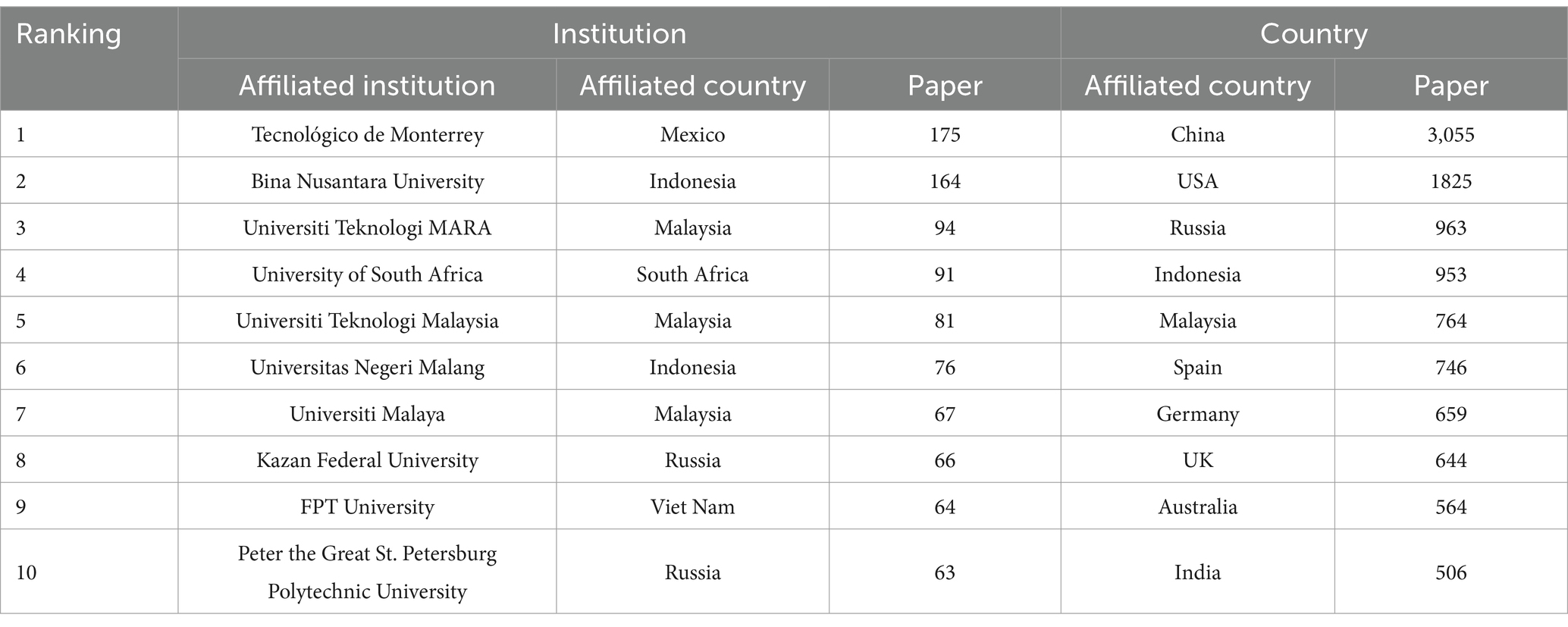
Table 3. Top 10 countries and institutions producing publication productivity in the research front “online learning.”
This ranking highlights the influence of certain institutions and countries in academic research, reflecting the global distribution of scholarly contributions. Notably, while China, the USA, and Russia lead in terms of the total number of publications, none of their affiliated institutions appear in the top 5 for individual contributions. Conversely, Indonesia and Malaysia are both top contributing countries and home to leading institutions in the list.
Table 3 highlights the strong presence of developing countries in digital education research. Mexico’s Tecnológico de Monterrey ranks 1st, with Indonesia and Malaysia also well-represented by multiple institutions, such as Bina Nusantara University (2nd) and Universiti Teknologi MARA (3rd). South Africa’s University of South Africa and Vietnam’s FPT University also feature prominently. These contributions underscore the growing influence of developing nations in shaping global digital education research, fueled by strategic investments in education and research infrastructure.
Artificial intelligence
The findings from recent publications reflect an increasing integration of Artificial intelligence and machine learning technologies in higher education, with a focus on enhancing personalized learning, improving administrative efficiency, and addressing ethical concerns. The cited studies, each with significant citation counts, underscore the critical and transformative role of Artificial intelligence in modern educational settings.
In the realm of personalized learning and adaptive systems, Artificial intelligence and machine learning have been increasingly used to create adaptive learning environments in higher education. These systems customize educational content based on individual student needs, leading to improved engagement and outcomes. Regarding AI-powered educational tools, the development and implementation of AI-powered tools, such as intelligent tutoring systems, automated essay scoring, and virtual teaching assistants, have significantly enhanced learning processes and provided valuable support for both students and educators (Hashim et al., 2022).
In terms of ethics and bias in artificial intelligence, significant attention has been given to the ethical implications of Artificial intelligence in higher education. Research has concentrated on the risks of algorithmic bias, data privacy issues, and the need for transparency and fairness in Artificial intelligence applications (Kaur et al., 2022).
Artificial intelligence and machine learning have also been employed in predictive analytics in higher education, particularly to identify at-risk students, predict academic success, and optimize educational pathways. These predictive models help institutions make data-driven decisions to enhance student retention and success. Finally, Artificial intelligence has been applied to streamline administrative Tasks in universities, such as admissions processing, scheduling, and student advising. AI-driven chatbots and virtual assistants have been widely adopted to improve operational efficiency and student support.
The data listed in Table 4 highlights the countries and institutions with the highest overall publication numbers. Top institutions by affiliated papers are Harvard Medical School (USA) - 102 papers, Ministry of Education (China) - 89 papers, Tecnológico de Monterrey (Mexico) - 80 papers, Sichuan University (China) - 70 papers and Chinese Academy of Medical Sciences (China) - 60 papers. Top countries by total number of publications consist of China - 3,008 papers, USA - 2,060 papers, India - 1,013 papers, UK - 570 papers and Germany - 471 papers.
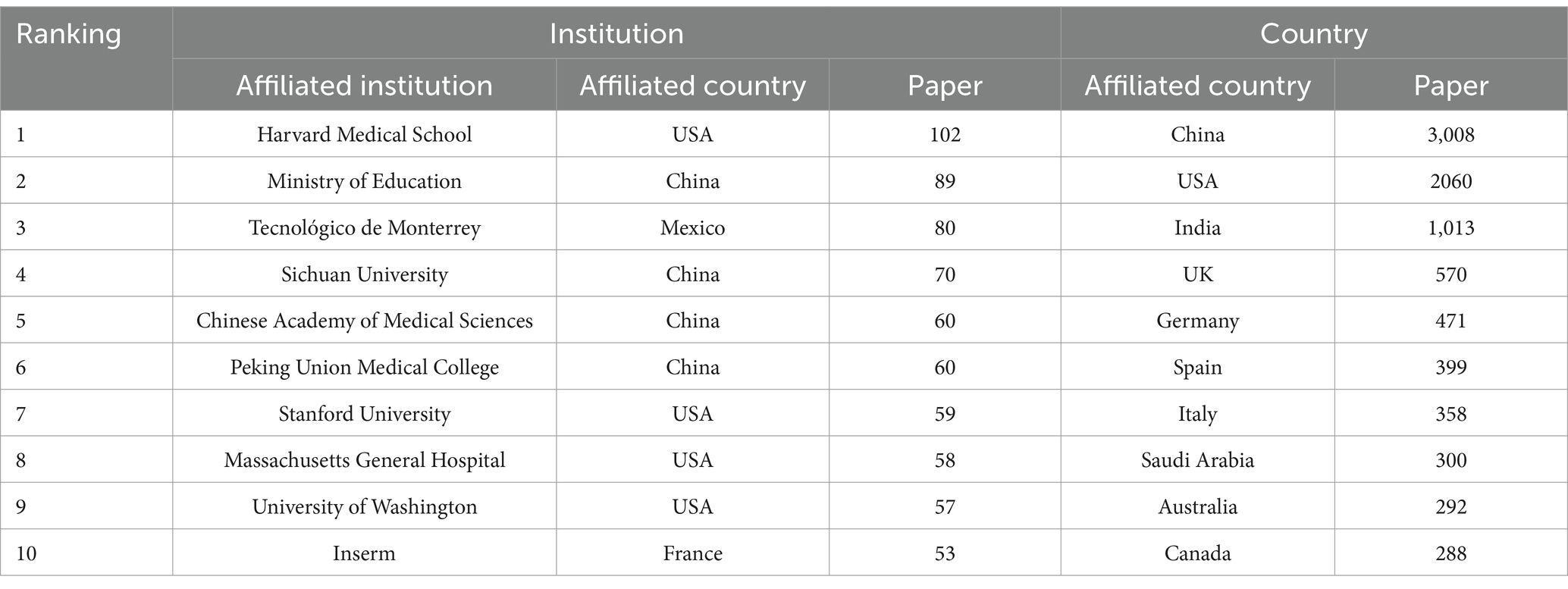
Table 4. Top 10 countries and institutions producing publication productivity in the research front “artificial intelligence.”
This ranking indicates that Harvard Medical School leads in the number of papers affiliated with a specific institution, while China ranks as the top country in terms of total publications. India and Germany are also significant contributors to the global academic landscape, with substantial numbers of total publications.
Additionally, the ranking emphasizes the leading role of institutions and countries from the USA, China, the UK, and Germany in academic research on AI. Mexico and India are notable for their strong presence, with Mexico represented among the top institutions and India among the top countries.
Concerning contributions from developing countries, four institutions make a significant impact: Tecnológico de Monterrey (Mexico) – ranked 3rd, Ministry of Education (China) – ranked 2nd, Sichuan University (China) – ranked 4th, and Chinese Academy of Medical Sciences (China) – tied for 5th, alongside Peking Union Medical College (China) – ranked 6th. The presence of institutions from China and Mexico highlights the growing influence of developing countries in global digital education research. These contributions demonstrate how strategic investment in education and research allows developing nations to shape emerging global research trends effectively.
This study focused solely on the Scopus database to identify research fronts in the digital educational ecosystem. While this may limit generalizability, Scopus was chosen for its broader coverage of applied sciences, social sciences, and outputs from emerging regions. Its inclusion of conference papers, non-English journals, and faster indexing makes it well-suited for capturing interdisciplinary and global trends. Nonetheless, future research could incorporate other databases to validate and extend these findings.
Conclusion
This study presents an innovative approach to identifying impactful research fronts in the digital education ecosystem by refining the traditional Clarivate methodology with a novel Impact Factor (IF) metric. The newly proposed IF metric addresses key limitations of the Clarivate Citation Production Trajectory (CPT) indicator by incorporating additional dimensions such as publication productivity, growth rate, and the temporal gap between core and citing papers. These enhancements offer a more nuanced understanding of how research fronts evolve and gain influence over time.
The application of this extended formulation to bibliometric data from Scopus (2019–2023) identified key emerging research fronts in digital education, with online learning and artificial intelligence standing out as the most influential areas. This finding reflects the growing importance of these fields in shaping modern educational practices and policies. Furthermore, the comparative analysis shows that the new IF metric provides more precise insights into the impact and immediacy of research contributions, surpassing the traditional CPT indicator in identifying emerging and transformative trends.
The study also highlights the global distribution of research activities in the digital educational ecosystem, revealing significant contributions from both developed and developing regions. This geographical analysis underscores the increasingly global nature of digital education research and the importance of fostering international collaboration to address global educational challenges.
In conclusion, the extended Clarivate formulation proposed in this study offers a more comprehensive and accurate method for identifying impactful research fronts in digital education. By incorporating additional bibliometric indicators, the new IF metric provides a clearer picture of the evolving digital education landscape, enabling researchers, policymakers, and educators to better understand and respond to emerging trends. This approach not only improves the identification of influential research fronts but also supports more informed decision-making in the rapidly evolving field of digital education. Indeed, the proposed Impact Factor (IF) metric provides a strategic tool for identifying high-impact and rapidly evolving research fronts. Researchers can use it to align their work with emerging priorities, while institutions may leverage it to inform strategic planning and resource allocation. For funding agencies, the metric supports evidence-based decisions by highlighting research areas with both strong scholarly influence and growth potential, thus enabling more targeted and forward-looking investment strategies.
Finally, future research could explore the applicability of the proposed IF metric beyond digital education, including domains such as health technology, environmental science, and AI ethics, where emerging research fronts also require dynamic assessment tools. Moreover, integrating this metric into bibliometric platforms like Scopus, Dimensions, or institutional dashboards could enable real-time monitoring of research trends, offering practical value for universities, funding agencies, and science policy stakeholders.
Data availability statement
The datasets presented in this study can be found in online repositories. The names of the repository/repositories and accession number(s) can be found in the article/Supplementary material.
Author contributions
TC: Writing – original draft, Writing – review & editing. NC: Writing – original draft, Writing – review & editing.
Funding
The author(s) declare that no financial support was received for the research and/or publication of this article.
Conflict of interest
The authors declare that the research was conducted in the absence of any commercial or financial relationships that could be construed as a potential conflict of interest.
Generative AI statement
The authors declare that Gen AI was used in the creation of this manuscript. The authors used ChatGPT 4.0 during the preparation of this work to review and, in some instances, enhance the text's flow. Following this process, the authors thoroughly reviewed and edited the content as necessary. The authors assume full responsibility for the data, methodology, and content of this publication.
Publisher’s note
All claims expressed in this article are solely those of the authors and do not necessarily represent those of their affiliated organizations, or those of the publisher, the editors and the reviewers. Any product that may be evaluated in this article, or claim that may be made by its manufacturer, is not guaranteed or endorsed by the publisher.
Supplementary material
The Supplementary material for this article can be found online at: https://www.frontiersin.org/articles/10.3389/feduc.2025.1557812/full#supplementary-material
References
Almazova, N., Krylova, E., Rubtsova, A., and Odinokaya, M. (2020). Challenges and opportunities for Russian higher education amid COVID-19: teachers’ perspective. Educ. Sci. 10:368. doi: 10.3390/educsci10120368
Bao, W. (2020). COVID-19 and online teaching in higher education: a case study of Peking University. Hum. Behav. Emerg. Technol. 2, 113–115. doi: 10.1002/hbe2.191
Bernard, R. M., Borokhovski, E., Schmid, R. F., Tamim, R. M., and Abrami, P. C. (2014). A meta-analysis of blended learning and technology use in higher education: from the general to the applied. J. Comput. High. Educ. 26, 87–122. doi: 10.1007/s12528-013-9077-3
Chung, N. H. T., and Cam, T. A. (2024). Clarivate research fronts in the digital education: perspectives from asean higher education system. J. Ecohumanism. 3, 12630–12645.
Dhawan, S. (2020). Online learning: a panacea in the time of COVID-19 crisis. J. Educ. Technol. Syst. 49, 5–22. doi: 10.1177/0047239520934018
Garfield, E. (1955). Citation indexes for science: a new dimension in documentation through association of ideas. Science 122, 108–111. doi: 10.1126/science.122.3159.108
Hashim, S., Omar, M. K., Ab Jalil, H., and Sharef, N. M. (2022). Trends on technologies and artificial intelligence in education for personalized learning: systematic literature. IJ-ARPED. 12:884–903. doi: 10.6007/IJARPED/v11-i1/12230
Hirsch, J. E. (2005). An index to quantify an individual’s scientific research output. PNAS 102, 16569–16572. doi: 10.1073/pnas.0507655102
Hodges, C., Moore, S., Lockee, B., Trust, T., and Bond, A. (2020). The difference between emergency remote teaching and online learning. Virginia Tech. Available online at: https://vtechworks.lib.vt.edu/server/api/core/bitstreams/a8e51482-265c-457f-9249-4717908b2022/content (Accessed December 16, 2024).
Kaur, D., Uslu, S., Rittichier, K. J., and Durresi, A. (2022). Trustworthy artificial intelligence: a review. ACM Comput. Surv. (CSUR) 55, 1–38. doi: 10.1145/3491209
Li, M., and Chu, Y. (2017). Explore the research front of a specific research theme based on a novel technique of enhanced co-word analysis. J. Inf. Sci. 43, 725–741. doi: 10.1177/0165551516661914
Mazov, N. A., Gureev, V. N., and Glinskikh, V. N. (2020). The methodological basis of defining research trends and fronts. Sci. Tech. Inf. Process. 47, 221–231. doi: 10.3103/S0147688220040036
Price, D. J. D. S. (1965). Networks of scientific papers: the pattern of bibliographic references indicates the nature of the scientific research front. Science 149, 510–515. doi: 10.1126/science.149.3683.510
Research Fronts. (2017). Institutes of Science and Development, Chinese Academy of Sciences. Available online at: http://www.casisd.cn/zkcg/zxcg/201706/P020170630548078477885.pdf (Accessed December 16, 2024).
Research Fronts. (2024). Institutes of Science and Development, Chinese Academy of Sciences. Available online at: http://english.casisd.cas.cn/research/rp/202412/P020241204460356658847.pdf (Accessed December 16, 2024).
Small, H., and Griffith, B. C. (1974). The structure of scientific literatures I: identifying and graphing specialties. Sci. Stud. 4, 17–40. doi: 10.1177/030631277400400102
Tran Ai Cam. (2025). Emerging research fronts in the digital educational ecosystem: a systematic qualitative and quantitative analysis. JIRSEA. 23.
Keywords: research fronts, digital educational ecosystem, impact factor metric, Clarivate analysis approach, bibliometric method
Citation: Cam TA and Chung NHT (2025) Impactful research fronts in digital educational ecosystem: advancing Clarivate’s approach with a new impact factor metric. Front. Educ. 10:1557812. doi: 10.3389/feduc.2025.1557812
Edited by:
Sunny Chi Lik Au, Tung Wah Group of Hospitals, Hong Kong SAR, ChinaReviewed by:
Rouhollah Khodabendelou, Sultan Qaboos University, OmanMinara Yeasmin, Aliah University, India
Copyright © 2025 Cam and Chung. This is an open-access article distributed under the terms of the Creative Commons Attribution License (CC BY). The use, distribution or reproduction in other forums is permitted, provided the original author(s) and the copyright owner(s) are credited and that the original publication in this journal is cited, in accordance with accepted academic practice. No use, distribution or reproduction is permitted which does not comply with these terms.
*Correspondence: Tran Ai Cam, dHJhbmFpY2FtNzVAZ21haWwuY29t; Nguyen Huu Thanh Chung, Y2h1bmduaHRAdm51LmVkdS52bg==
†ORCID: Tran Ai Cam, https://orcid.org/0009-0006-7411-4280
Nguyen Huu Thanh Chung, https://orcid.org/0009-0007-6293-6129
 Tran Ai Cam
Tran Ai Cam Nguyen Huu Thanh Chung
Nguyen Huu Thanh Chung